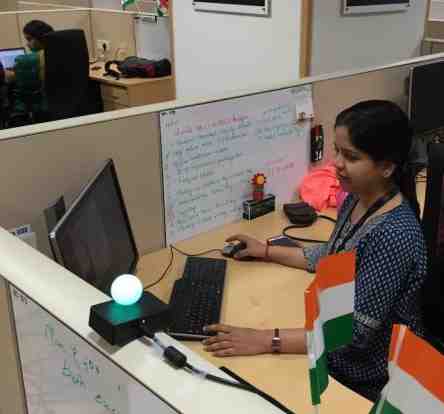| Red Light Alert! Programmer At Work! |
| Written by Sue Gee |
| Saturday, 06 May 2017 |
|
FlowLight provides a signal about a worker's status, switching from green to red when you shouldn't be disturbed by colleages. Having been tested with around 450 employees it appears to work and the majority of users want to continue to use it. When a programmer is 'in the zone' deeply involved in coding a complex algorithm then a trivial interruption can be very costly, both in the time needed to recover your thread or in mistakes that are caused by forgetting what you planned to do. All in all, being disturbed while programming is really bad. Indeed, Mike James goes as far as saying (in On the Unhappiness of Software Developers) being serially interrupted while coding is what makes him most unhappy I should know this as I'm a repeat offender. Making a seemingly innocuous comment to a colleague who is programming, or worse a simple request, is enough to break a train of thought that is difficult to recover. FlowLight, is a desk light that switches between green and red based on keyboard and mouse activity. According to Thomas Fritz, an assistant professor of computer science at the University of British Columbia who started work on the invention at the University of Zurich: "The light is like displaying your Skype status - it tells your colleagues whether you're busy or open for a chat." The idea for the FlowLight originated at ABB Inc., a multi-national company, where employees were resorting to putting road safety cones on their desk when they were coding and didn't want to be interrupted. Converting this to an automatic signal was important since once someone is focused on a task, stopping to manually turn on a light, close your office door or put a cone on your desk is disruptive to the work and cumbersome.
The results of a trial of FlowLight with 449 employees from ABB in twelve countries, including India, Scandinavia, Vietnam, Poland and Argentina are being presented at CHI 2017, an Association for Computing Machinery conference taking place May 6-11 in Denver Colorado. The study, which was of knowledge workers, revealed that FlowLight reduced interruptions of participants by 46% and raised awareness of the potential disruptiness of interruptions. The led to a change in office culture so that people were more respectful of each other's time. Some employees even reported that the lights motivated them to finish their work faster as being green made them feel as though they were slacking. 80% of participants in the trial stated their intention to keep using the FlowLight after the trial period and in fact even more of them (85%) were still using it two months later. One limitation of FlowLight's use with programmers rather than the wider group of employees on which it was tested, who were described as knowledge workers, is that keyboard and mouse activity might be a poor indicator of being hard at work. You can be staring into space trying to come up with an elegant algorithm or poring over a listing (or scrolling slowly down a screen) trying to locate a bug. This has already been recognized by the team and Fritz and his PhD student Manuela Zuger from the University of Zurich, have recently tested a more advanced version of the FlowLight with companies in Vancouver to determine whether it can be improved by using biometric sensors to detect heart rate variability, pupil dilation, eye blinks or even brainwave activity. All of these indicators would probably be relevant to programmers and an earlier study co-authored by Thomas Fritz has already indicated that biometrics can help predict code quality, see Wire Up The Programmer To Avoid Bugs. Whether programmers would want to work laden with biometric sensors is, however, another question and just having the additional ability to manually turn a light from green to red, and vice versa, would probably be sufficient. More InformationReducing Interruptions at Work: A Large-Scale Field Study of FlowLight by Manuela Zuger, Christopher Corley, Andre N. Meyer, Boyang Li, Thomas Fritz, David Shepherd, Vinay Augustine, Patrick Francis, Nicholas Kraft, Will Snipes Related ArticlesOn the Unhappiness of Software Developers Wire Up The Programmer To Avoid Bugs
To be informed about new articles on I Programmer, sign up for our weekly newsletter, subscribe to the RSS feed and follow us on Twitter, Facebook or Linkedin.
Comments
or email your comment to: comments@i-programmer.info |
| Last Updated ( Saturday, 06 May 2017 ) |


